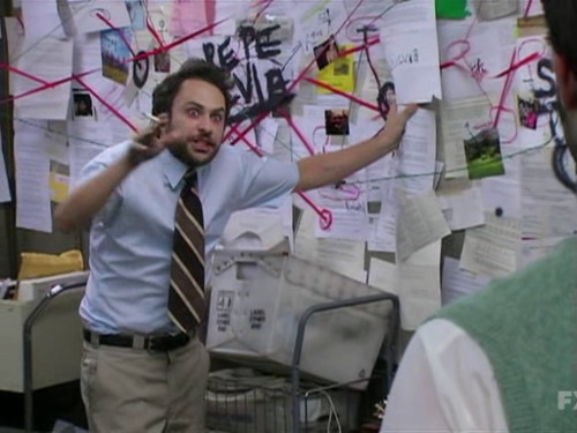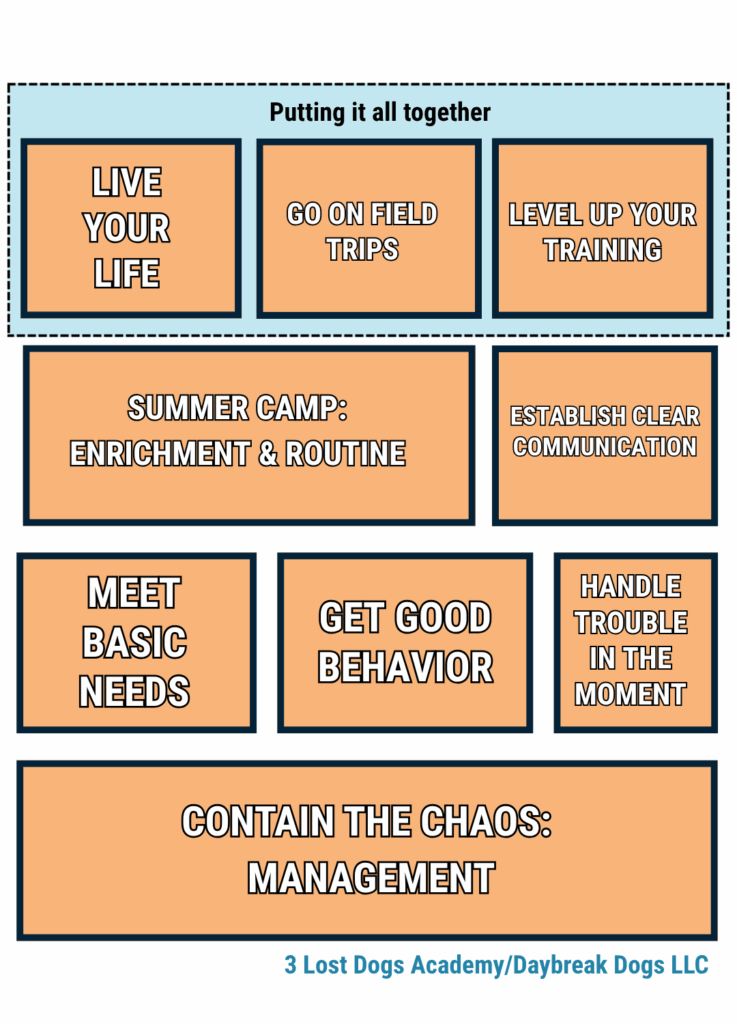Puppy Survival School has always been based around the “Core Strategy:”
Prevent unwanted behavior from getting reinforced, while training and reinforcing behavior you like.
Or even simpler: prevent bad, reward good.
I started teaching this about ten years ago, when I created our first guide to raising a puppy without losing your mind.
At the time, I was just beginning to specialize in the WTFWIT phase. I didn’t yet have a firm grasp on all the intricacies of this phenomenon. I just knew these people were exhausted and overwhelmed by thoughts like:
“I can’t do this.”
“I made a mistake.”
“I should give the puppy back.”
My theory: all the advice out there was too complicated. Maybe people couldn’t just hold onto dozens of rules, checklists, and techniques. That’s a lot to ask when you’re sleep-deprived and hanging by a thread.
So I thought it would help if they had a simple framework. One easy-to-remember mantra:
Prevent bad. Reward good.
That became the cornerstone of Foundation for a Happy, Well-Behaved Puppy. And therefore, the cornerstone of Puppy Survival School.
And… it works.
It gives people a sense of direction.
But the longer I do this work, the colder that approach feels. It takes what should be a mad, wild, magical adventure and reduces it to something clinical and black-and-white.
That simple framework does relieve people of the “ahhh I don’t know what I’m doing” panic. But it trades it for a different kind of stress: analyzing every single moment like it’s a math problem.
- “If I let him out of the crate while he’s barking, am I just rewarding the barking?”
- “If I give her attention right now, am I reinforcing demand behavior?”
- “If I let her pick up that stick, am I allowing a bad habit to form?“
When you’re constantly analyzing your dog, you stop seeing them.
When you’re afraid of messing everything up, you stop thinking clearly. You stop trusting yourself.
And you definitely stop having any fun.
Ironically, this is exactly what I was trying to avoid in the first place.
At the Academy, we do our best to be a refuge from the drama and unrealistic standards of the Dog World – a world that sure seems to delight in telling people that their dog’s behavior is all their fault and that any mistake is a catastrophe.
And I think we do a good job of this with our overall messaging and vibe.
But in the past year or so, it really hit me: as long as “Prevent Bad, Reward Good” is our foundation, we’re still part of the problem.
We can do better.
We’ve developed a new methodology through our work with one-on-one coaching students. Originally, we weren’t going to roll it out to the membership until we could do a complete remake of the entire Puppy Survival School program in a year or two.
But last month, something snapped in my brain.
I was writing promotional content for social media (a necessary evil if we want to, you know, pay our bills), and I just… couldn’t do it.
I could not ask people to spend money on something I no longer believed in.
Erin and I are both over the Dog World’s obsessive focus on reinforcement and consequences. (Not to mention the endless discourse about the Four Quadrants of Operant Conditioning like it’s a sacred text. Yawn)
Do those things matter? Sure. But not as your core strategy.
It’s like sugary cereal: great as one small part of a balanced breakfast. On its own? Liable to give you a crash and leave you hungry for something more. Something real.
So yeah. I couldn’t promote the Old Ways a single minute longer.
I got to work rebuilding the Foundation for a Happy, Well-Behaved Puppy course (i.e. the primary course in Puppy Survival School).
Over two weeks, I turned all the scattered, disorganized bits of our new approach into a cohesive new core strategy.

Guys, it even has an acronym.
Introducing the Puppy PEACE Roadmap
“Foundation 2.0” is built around this new signature framework.
The old approach unintentionally created pressure to be perfect and could make people feel like they’re perpetually one mistake away from ruining everything.
The new approach is way more chill. More well-rounded and nuanced. It throws out the laser-focus on reinforcement. (Or, in hindsight, the unhinged obsession with reinforcement)
The new guiding philosophy: empathy over micromanagement
I thought people in the WTFWIT phase needed a ridiculously simple mantra. But after ten years helping hundreds more people through this phase, I realized I was wrong:
It’s not that they needed simpler advice. They needed advice they could believe in. They needed hope.
Because when you believe things can get better, you stop panicking. You become capable of handling nuance and absorbing new information. Capable of being resilient and taking setbacks in stride.
I do still think it helps to have a simple “north star” to guide you.
How about this one:
Empathy.
Your puppy isn’t a little robot who needs programming.
They’re a baby. A baby who just lost their family. Who’s overwhelmed, confused, exhausted, lonely, and trying their best in a world where nothing makes sense.
The moment you give yourself permission to feel – to imagine what your puppy is going through, to connect with your own humanity, everything starts to shift.
Empathy is the thread that ties everything together. It’s the heart of the PEACE Strategy.
What’s new in the course
Here’s what’s changed in the updated Foundation for a Happy, Well-Behaved Puppy course:
Bite-sized, human-friendly lessons
Instead of a few long videos, it’s now broken into a bunch of shorter, actionable lessons.
It’s also organized into more modules, making it easier to navigate and actually complete. Each module is a “block” in the “foundation,” and the new graphic shows different sizes for each block so you can instantly tell what’s most important:

Less overwhelm, more clarity, better results.
Updated strategies and tactics
We’ve combined everything we’ve learned from years of student feedback with all the new tricks we’ve got up our sleeves.
Brand new lessons that cover common concerns we didn’t address in the original
Yep, including “my puppy picks up all kinds of stuff they can’t have!”
A better Puppy Taming Game… taught in a way you probably haven’t seen before
This core exercise didn’t work for a lot of students.
And we could’ve just quietly updated the tutorial. Instead, I got all meta and made a whole module on Puppy Taming that talks about WHY it can be such a problem. If you work through that block, you’ll be better prepared to troubleshoot problems you encounter in any of your training.
The Summer Camp Method
A new way of thinking about puppy-raising that brings some magic back into the experience. It actually feels kind of fun and achievable, instead of like a never-ending checklist of exhausting chores.
Puppy adventures & field trips
An in-depth guide to the best way to socialize and exercise your puppy away from home.
“Advanced” training concepts
These are things that trainers don’t usually teach puppy parents, because we tend to think “meh, no one cares about this stuff. They just want their puppy to stop biting.”
But these are the very concepts that actually make biting a non-issue. You’ll start thinking like a dog trainer and be miles ahead of the other puppy parents at the playground.
How this affects the rest of Puppy Survival School
Foundation is now the main course of PSS. All the others with the PSS logo can be thought of as “satellite” courses that go into more detail on specific issues.
We’ve been updating those courses gradually, and a lot of that content already reflects the PEACE Strategy. Some lessons still refer to the old Core Strategy, but they still flow pretty well with the new approach. (And yes, we’ll continue updating them)
Enough rambling. Go see it all for yourself in Foundation for a Happy, Well-Behaved Puppy!
